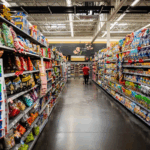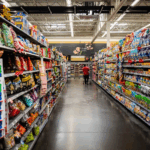
Nutrition scientist Dr. Kevin Hall may not be a household name, but he’s famous. He’s one of the only researchers in the world to conduct not one, but two gold-standard clinical trials on the impact of ultraprocessed foods on the growing obesity crisis.
During Hall’s first clinical trial at the US National Institutes of Health, 20 healthy volunteers consumed 500 additional calories a day when they ate ultraprocessed foods compared with when they ate meals made from whole foods. In the second clinical trial, not yet published, 36 sequestered volunteers ate an additional 1,000 calories a day when on the ultraprocessed food diet, according to a midpoint analysis of the data by Hall.
“These are two of the most important experiments ever done in nutrition, not least because they were so rigorously controlled. The study subjects were essentially imprisoned and could not forget, lie or cheat about what they ate,” said Marion Nestle, the Paulette Goddard Professor of Nutrition, Food Studies and Public Health, Emerita, at New York University.
Which foods spurred people to eat the most calories? Ultraprocessed meals that were both energy dense (lots of calories per bite) and hyperpalatable (“Betcha can’t eat just one”).
Insights from the two studies, along with Hall’s decades of research into low-fat, low-carb diets, the role of metabolism, and the weight loss success of contestants on “The Biggest Loser,” has led to his new book, “Food Intelligence: The Science of How Food Both Nourishes and Harms Us.” It was coauthored by journalist Julia Belluz.
Hall was a senior investigator at the NIH until he retired in April after denouncing censorship of his research findings by the US Department of Health and Human Services, which oversees the NIH.
CNN spoke to Hall about nutritional myth busting and why he believes it’s our food supply, not a lack of willpower, that leads to overeating.
This interview has been lightly edited and condensed for clarity.
CNN: You named your book “Food Intelligence.” Why?
Dr. Kevin Hall: Forgive the pun, but people really do hunger for knowledge about nutrition because there’s all this noise out there — often with very competing views and recommendations.
Too often people in nutrition science fall into this trap of thinking, “Oh, we’ve got it all figured out,” so they trot out some new diet, such as low-fat or low-carb, or supplements or devices or whatever it is that may not have been rigorously tested to hold up to scientific scrutiny.
For body fat, for example, it doesn’t matter too much whether you’re on a high-carb, lower fat diet or a low-carb, keto-like diet. Science has found the difference in body fat loss between the two is minimal when diet calories are similar. Yet that doesn’t stop the continuing argument between true believers in both camps.
We didn’t want to do another book about “here’s what you should really do and here’s what you should avoid,” but instead give people an appreciation for how science has progressed. Then hopefully they can determine for themselves what’s mostly hype at this stage compared to promising research.
CNN: Why do you say our food environment is to blame for our ever-expanding waistline?
Hall: Food intake is a biologically controlled phenomenon. Our food choices are guided by environmental and social cues — integrated with an internal symphony of hormonal and neural signals — an orchestra all conducted by the brain. Yet we aren’t consciously aware of that process.
Now we’re beginning to see that our food environment can disrupt those signals in ways we are only beginning to understand. For example, signals from the gut to the brain might be disrupted when nutrients in ultraprocessed foods are paired with some additives.
It’s true that some people have been very successful at making changes in their lifestyles leading to weight loss. However, when you’re faced with a food environment that is stacking the deck against you, it makes it so much more difficult to make the right choices. I hope people realize this is not their fault.
In the past, our food environment was much different. We may have had Grandma’s decadent apple pie to tempt us, but it was a rare treat. Today that indulgence is now conveniently available nearly everywhere all day, any day, at little expense. Those foods are heavily marketed by industry, including to our children.
Now some ultraprocessed foods aren’t necessarily any worse than Grandma’s apple pie. It’s just that they’re so readily available today they can influence a much wider population of people than Grandma could ever hope to from her kitchen.
There is science to suggest that indeed, some people clearly experience something very much like addiction from ultraprocessed foods. And we already have reasonable evidence that diets high in ultraprocessed foods are likely harmful to health.
Now, we have new science that suggests we overeat ultraprocessed foods mainly because they are energy dense and are formulated with nutrient combinations that are defined as hyperpalatable.
CNN: How do I go about choosing a food that is low in energy density and less hyperpalatable? Will it be the amount of sugar in the food? The amount of fat or salt?
Hall: Our studies were not designed to tease apart which of the components are most important — energy density or hyperpalatability — or what combinations of sugar, salt and fat may lead to overeating. We need more research to work out the details.
It’s also not easy for consumers to figure this out with current food labels. While you can calculate energy density by dividing the calories by the serving size, that doesn’t work for all products. Dried pasta, for example, has a different energy density than cooked pasta, so the nutrition facts panel isn’t helpful.
To track hyperpalatability, you’ve got to keep track of the carbs, the sodium and the added sugar and identify whether these pairs of nutrients have crossed certain thresholds. So unless we mandate labels which do this for us, it’s too much work for the consumer to do in a reliable way.
We also need a shift in the food environment so that by default more nutritious foods will be the most readily available foods and those with deleterious properties are taxed or regulated and once again become indulgences to be consumed rarely.
In the meantime, people can choose convenient ultraprocessed foods that make it easier for them to have a diet of more fruits, vegetables, legumes and whole grains. One of the things that I do in my day-to-day life is choose ready-to-eat meals that don’t contain a lot of added sugar or saturated fat but have lots of whole grains and veggies and legumes.
If I’m at home cooking, I’m not going to make up marinara sauce from scratch, right? I’m going to buy a premade marinara sauce that’s low in sodium and sugar and add it to a bunch of vegetables over a whole grain pasta. That makes a pretty healthy meal from a nutritional perspective.
So, my advice is to choose ultraprocessed foods with better nutritional profiles, lower salt, sugar and saturated fat, to make it more convenient to eat a healthier overall diet. Don’t get stuck on the idea that the product is ultraprocessed. Focus on how they may help you to eat a better diet over the longer term.
CNN: You said you wanted people to be able to determine what is valid research and what is hype. In your opinion, what is hyped in nutrition today?
Hall: One area I worry about is the premature commercialization of precision nutrition — the idea of how your unique biology might provide a definitive diet prescription that is best for you.
There are companies offering to tailor diet advice based on your gut microbiome, or continuous glucose monitoring or a variety of genetic measurements. They want to sell you these biohacks, wellness supplements or devices that will supposedly guide you toward better diet decisions.
Yet there aren’t any strong, convincing studies suggesting those approaches offer any benefits over the standard, boring diet advice that we’ve had for decades: Eat more vegetables, fruits, whole grains and legumes while eating less saturated fat, added sugars and sodium.
Precision nutrition may be promising in the future for the select few people who have the privilege of engaging in these potentially expensive interventions. For the most part, however, I think that they’re mostly hype at this stage.
CNN: You also tackle other beliefs science has disproven but still prevail today, such as boosting metabolism to lose weight. You uncovered that myth while studying contestants in season 8 of “The Biggest Loser.”
Hall: Our previous concepts about metabolism as it relates to weight loss are often confused and even backwards. People believe that a slow metabolism means it’s more difficult to lose weight, but when you actually measure this in an environment where people are undergoing weight loss and weight regain, you find surprises.
We found contestants whose metabolism slowed the most at the end of this crazy “Biggest Loser” competition did not experience the most weight regain. In fact, there was no predictive power in that whatsoever.
Yet people continue to buy supplements that claim to speed up metabolism — in fact, people can still buy dinitrophenol or DNP supplements online. It’s one of the first metabolism-boosting drugs removed from circulation by the (Food and Drug Administration) because it caused several deaths and blindness. This is a very poorly policed and regulated industry.
- President Commissions 36.5 Million Dollars Hospital In The Tain District
- You Will Not Go Free For Killing An Hard Working MP – Akufo-Addo To MP’s Killer
- I Will Lead You To Victory – Ato Forson Assures NDC Supporters
Visit Our Social Media for More




